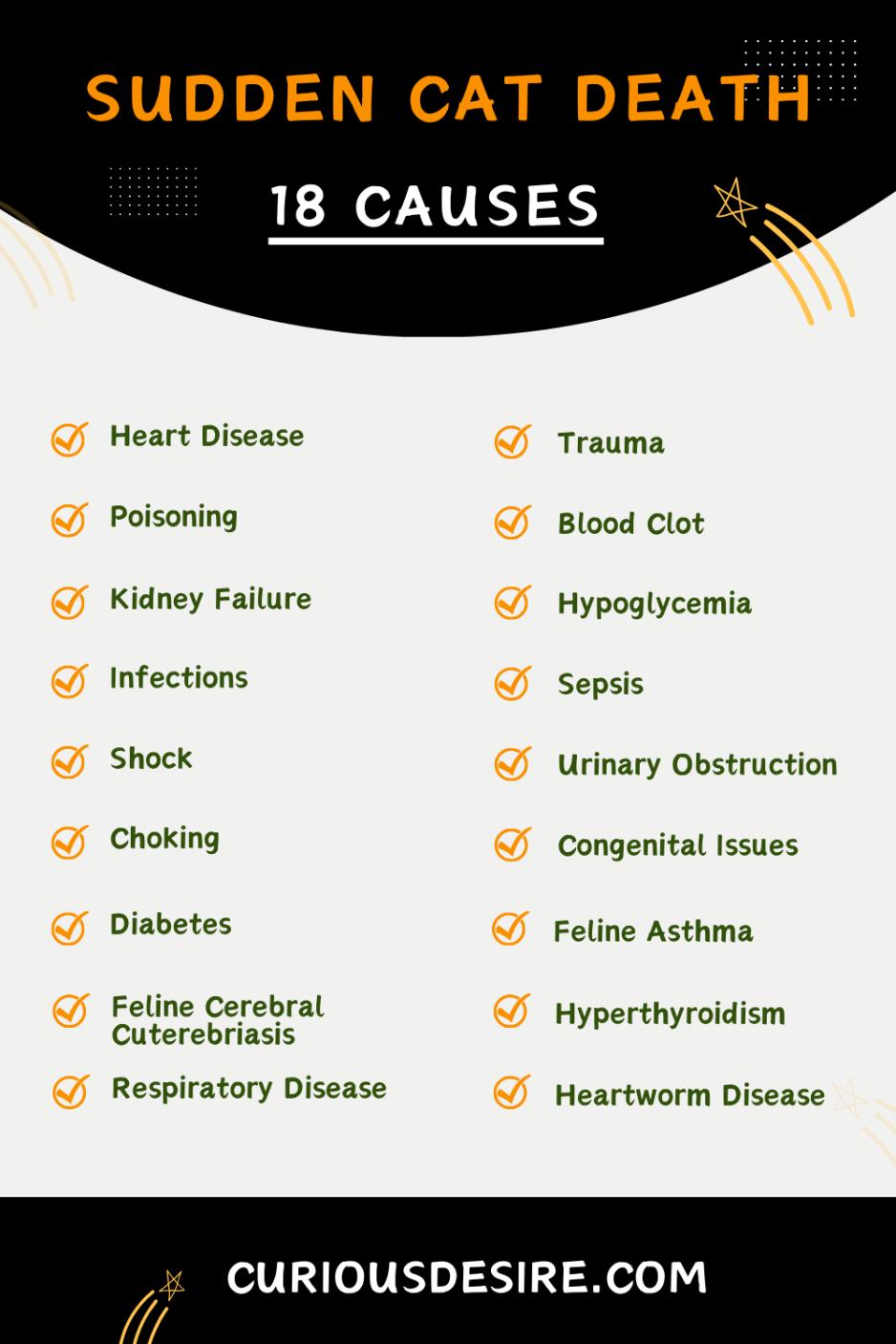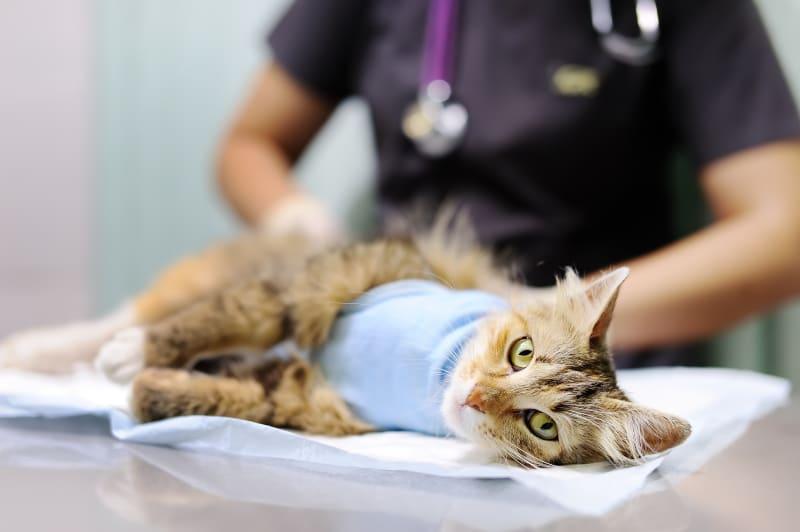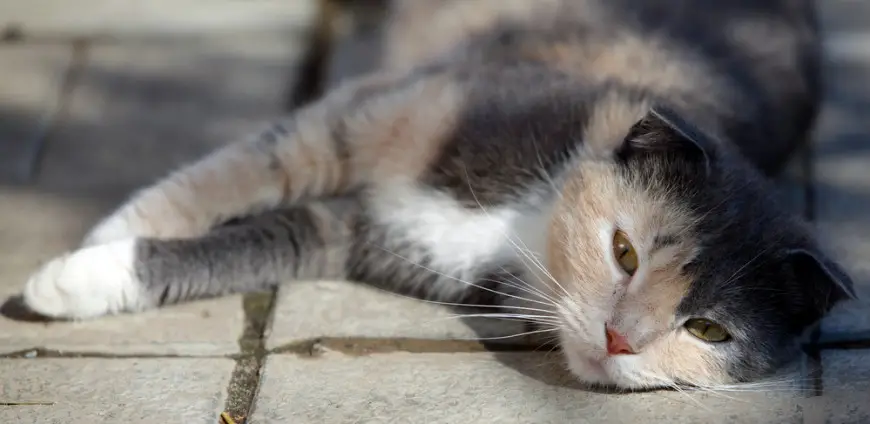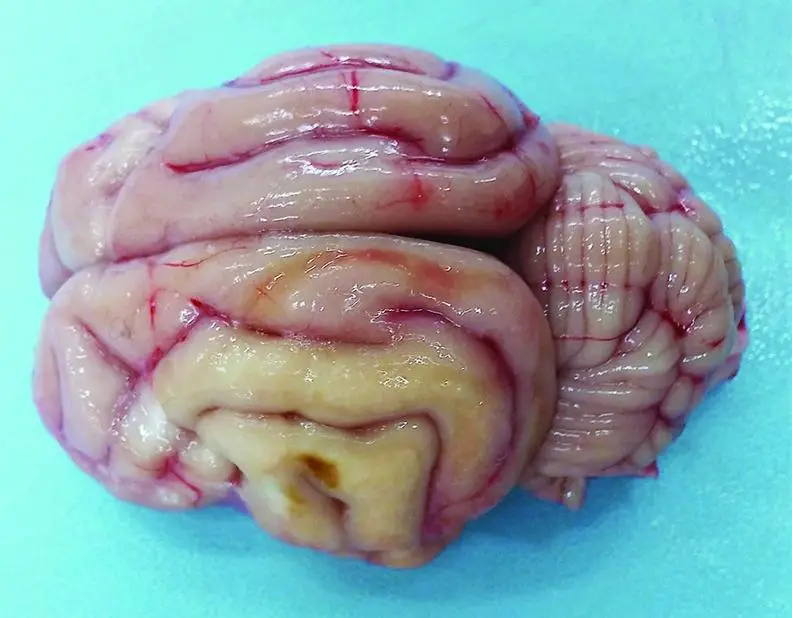The sudden and unexplained death of a beloved feline companion can be a heart-wrenching experience for any cat owner. In this guide, we’ll talk about the reasons why this happens.
It’s not just about finding answers; it’s also about helping you understand and cope with the unexpected loss of your furry friend.
Let’s explore the possible causes of sudden cat deaths together.
Here are the 5 most common causes of sudden cat death:
- Heart Disease
- Blood Clot
- Infections
- Sepsis
- Urinary Obstruction
[toc]

Cause 1: Heart Disease
Heart disease in cats, often referred to as cardiomyopathy, is a condition where the heart muscle weakens, affecting its ability to pump blood efficiently. This can lead to congestive heart failure, causing sudden death.
There are different types of cardiomyopathy, with hypertrophic cardiomyopathy (HCM) being particularly common in some breeds like the Maine Coon.
HCM thickens the heart walls, impairing its function and increasing the risk of blood clots. These clots can then travel to other parts of the body, causing severe complications.
Early detection through regular veterinary check-ups is crucial for managing heart disease in cats. Symptoms may include:
- Lethargy
- Difficulty breathing
- Sudden collapse
Cause 2: Trauma
Trauma, such as accidents or falls, is a leading cause of sudden death in cats. Cats are curious creatures and may get into situations where they can experience severe injuries.
Falls from high places, car accidents, or encounters with larger animals can result in fatal trauma.
Internal injuries may not always be immediately apparent, emphasizing the importance of prompt veterinary attention after any suspected trauma.
Prevention involves creating a safe environment for your cat, minimizing potential hazards, and keeping them indoors if possible.
Cause 3: Poisoning
Poisoning can occur when a cat ingests toxic substances like certain plants, chemicals, or human foods. Common toxins include lilies, certain household plants, chocolate, and some medications.
The effects of poisoning can be rapid and severe, leading to sudden death. Symptoms may include:
- Vomiting
- Lethargy
- Seizures
- Difficulty breathing
Cause 4: Blood Clot
Blood clots, or thromboembolism, can obstruct blood vessels and prevent normal blood flow.
Cats with heart disease, especially hypertrophic cardiomyopathy (HCM), are at an increased risk of developing blood clots.
When a clot dislodges and travels to other parts of the body, it can cause sudden distress and organ damage. Symptoms may include:
- Paralysis
- Pain
- Difficulty breathing.
Cause 5: Kidney Failure
Kidney failure, whether acute or chronic, can lead to sudden death in cats. The kidneys play a crucial role in filtering toxins from the blood and maintaining fluid balance.
When the kidneys fail, toxins can build up rapidly, causing a range of symptoms including:
- Lethargy
- Vomiting
- Loss of appetite
Identifying the underlying cause of kidney failure is important for determining the appropriate treatment, and supportive care may be necessary to manage the condition.
Cause 6: Hypoglycemia
Hypoglycemia, or low blood sugar, can occur in cats, especially those with diabetes. Sudden drops in blood sugar levels can lead to seizures, loss of consciousness, and, in severe cases, sudden death.
Proper management of feline diabetes through diet, medication, and regular monitoring is essential to prevent hypoglycemic episodes.
Owners should be vigilant in recognizing signs of hypoglycemia and seek immediate veterinary attention if suspected.
Cause 7: Infections
Various infectious diseases, such as feline infectious peritonitis (FIP) or feline leukemia virus (FeLV), can lead to sudden health deterioration in cats.
These diseases compromise the immune system, making cats vulnerable to secondary infections.
Symptoms may include:
- Fever
- Weight loss
- Lethargy
Timely vaccinations and regular veterinary check-ups are crucial for preventing and managing infectious diseases in cats.
Cause 8: Sepsis
Sepsis occurs when an infection spreads throughout the body, causing a systemic inflammatory response. It can lead to organ failure and, ultimately, sudden death.
In cats, sepsis may result from untreated infections or complications following surgery.
Prompt recognition of symptoms such as fever, rapid breathing, and lethargy is essential for seeking immediate veterinary care.
Cause 9: Shock
Shock is a life-threatening condition where the body’s vital organs receive inadequate blood supply. It can result from severe trauma, blood loss, or certain medical conditions.
Cats in shock may exhibit:
- Pale gums
- Rapid breathing
- Lethargy
Immediate veterinary intervention is crucial to stabilize the cat, address the underlying cause, and prevent further deterioration.
Cause 10: Urinary Obstruction
Urinary obstruction, often seen in male cats, occurs when there is a blockage in the urinary tract, preventing normal urine flow.
This condition can lead to a rapid buildup of toxins in the body, causing sudden distress. Symptoms may include:
- Straining to urinate
- Vocalization
- Lethargy

Cause 11: Choking
Choking can occur if a cat ingests a foreign object or has difficulty swallowing. Cats may choke on small toys, bones, or other items. Signs of choking include:
- Gagging
- Difficulty breathing
- Distress
Immediate action is required to clear the airway and prevent suffocation. If you suspect your cat is choking, seek veterinary assistance promptly.
Cause 12: Congenital Abnormalities
Congenital abnormalities, present from birth, can sometimes lead to sudden death in cats. These may include structural defects in the heart, respiratory system, or other vital organs.
Some abnormalities may not be immediately apparent and can manifest as the cat grows. Regular veterinary check-ups can help detect congenital issues early on.
Cause 13: Diabetes
Diabetes in cats can lead to various complications, including sudden death if not properly managed. Insulin regulation is crucial, and cats with diabetes may experience fluctuations in blood sugar levels.
Symptoms of uncontrolled diabetes include:
- Increased thirst
- Excessive urination
- Weight loss
Regular monitoring, proper diet, and insulin administration are essential for managing feline diabetes.
Cause 14: Feline Asthma
Feline asthma is a respiratory condition that can cause sudden breathing difficulties in cats. It is characterized by inflammation of the airways, leading to coughing, wheezing, and labored breathing.
Triggers for asthma attacks may include environmental allergens or stress.
Medications and environmental management are key components of managing feline asthma and preventing sudden respiratory distress.
Cause 15: Feline Cerebral Cuterebriasis
Feline Cerebral Cuterebriasis occurs when larvae of the Cuterebra fly infest the brain. This rare condition can lead to neurological symptoms, seizures, and sudden death.
Preventive measures, such as keeping cats indoors during peak fly activity, can help reduce the risk of infestation.
Cause 16: Hyperthyroidism
Hyperthyroidism is an endocrine disorder where the thyroid gland produces excessive amounts of thyroid hormone. This can lead to various complications, including heart disease and kidney failure, contributing to sudden death.
Symptoms may include
- Weight loss
- Increased appetite
- Hyperactivity
Medication or other treatment options are available to manage hyperthyroidism in cats.
Cause 17: Respiratory Disease
Respiratory diseases in cats, encompassing conditions like pneumonia or severe respiratory infections, can present as significant threats to their well-being.
These ailments affect the feline respiratory system, comprising the nose, throat, windpipe, and lungs, potentially leading to sudden respiratory distress and, in severe cases, even death.
Symptoms may include
- Coughing
- Difficulty breathing
- Lethargy
Cause 18: Heartworm Disease
Heartworm disease, typically associated with dogs, can also impact cats, potentially leading to sudden death. The disease is caused by the parasitic worm Dirofilaria Immitis, transmitted through mosquito bites.
While adult heartworms in dogs primarily reside in the heart and lungs, in cats, they can migrate to various locations, causing inflammation and damage, particularly in the lungs and arteries.
Symptoms may include coughing, difficulty breathing, vomiting, and sudden collapse, although some cats may show no apparent signs.
Diagnosing heartworm disease in cats is challenging, involving blood tests and imaging to detect the presence of worms or assess organ damage.
Treatment options are limited, focusing on supportive care to manage symptoms and control inflammation.
Final Thoughts
In conclusion, knowing the potential reasons for sudden cat death is vital for cat owners. Whether it’s heart issues, trauma, poisoning, or infections, each situation demands quick veterinary attention.
Recognizing symptoms like coughing or difficulty breathing is crucial for early detection.
Ensuring a safe environment, regular vet check-ups, and vaccinations are essential for keeping cats healthy.
In moments of sudden distress, getting prompt veterinary care is crucial to identify the problem and start the right treatment.
By staying informed and taking preventive steps, we can provide the best care for our feline friends.
Sudden Cat Death Causes FAQs
1. Why did my cat die suddenly with no symptoms?
Sudden and unexplained cat deaths can be attributed to various factors, including underlying health issues, heart conditions, organ failure, toxic ingestion, or sudden trauma.
It’s challenging to pinpoint the exact cause without a necropsy (animal autopsy) performed by a veterinarian.
2. What is the most common cause of cat death?
Common causes of cat deaths include age-related illnesses, kidney disease, cancer, infections, and trauma.
Regular veterinary check-ups, a balanced diet, and a safe environment can help prevent some of these issues.
3. What to do if your cat dies at home?
- Contact a Veterinarian: Inform your veterinarian about the situation.
- Arrange for Aftercare: Decide if you want burial or cremation services.
- Handle with Care: If you need to move your cat, do so gently and with respect.
- Take Time to Grieve: Allow yourself and your family time to mourn the loss.
4. What happens when a cat dies naturally?
When a cat dies naturally, the body undergoes post-mortem changes. Rigor mortis sets in, body temperature drops and the cat’s muscles relax.
These changes occur gradually and can help confirm natural death.
5. What happens right before a cat dies?
Before a cat dies, there may be signs such as lethargy, loss of appetite, difficulty breathing, and withdrawal.
However, each cat’s experience is unique, and some may pass away peacefully in their sleep.
6. How can you tell if a cat is nearing death?
Signs of a cat nearing death may include extreme lethargy, difficulty breathing, disorientation, lack of interest in surroundings, and a noticeable decline in overall health.
7. How can I help my cat pass peacefully?
- Comfort and Familiarity: Provide a quiet and comfortable space.
- Affection: Spend time with your cat, offering gentle strokes and soothing words.
- Veterinary Support: Consult with your veterinarian for guidance on pain management or euthanasia if needed.
8. What is the last stage in a cat’s life cycle?
The last stage in a cat’s life cycle is old age or senescence. During this phase, cats experience physical decline and may develop age-related health issues.
9. How do cats show pain?
Cats may show pain through subtle behavioral changes like decreased activity, changes in grooming habits, vocalization, altered appetite, and aggression.
Monitoring these signs helps identify potential pain, and a veterinarian should be consulted for proper diagnosis and treatment.
10. How long does it take for a cat to pass away naturally?
The time it takes for a cat to pass away naturally varies and depends on factors such as underlying health conditions.
Some cats may experience a gradual decline over weeks, while others may pass away more swiftly.
11. Do cats pass away in their sleep?
Yes, some cats do pass away in their sleep. It’s often considered a peaceful way for them to leave the world, and it may be associated with natural causes or old age.
12. How can I help my cat pass away peacefully?
- Comfortable Environment: Ensure your cat is in a calm and familiar space.
- Company: Stay with your cat, offering companionship and reassurance.
- Professional Guidance: Consult your veterinarian for advice on managing any pain or discomfort.
13. What is the last stage in a cat’s life cycle?
The last stage in a cat’s life cycle is death. It’s a natural part of the life cycle, and providing comfort and care during this time is essential for both the cat and its owner.

